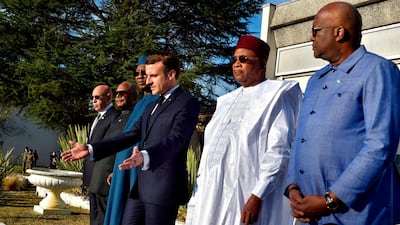France and West African states agreed on Monday to unite their forces under a joint command structure to fight terrorists in the Sahel region.
France also said it will send an extra 220 soldiers to boost its military presence in the Sahel.
French President Emmanuel Macron on Monday addressed a summit attended by the leaders of five West African nations aimed at shoring up support for France’s military operations in the Sahel.
In a statement after the meeting, the Sahel nations urged US to maintain "crucial support" in the fight against ISIS. Mr Macron said that he hoped to convince US President Donald Trump to keep US forces in Africa. The US, which provides logistical support to France’s Barkhane force and maintains a drone base in Niger, earlier on Monday signalled it wanted to reduce its military presence in Africa.
Ahead of the meeting, which came as Niger dismissed its military chief after a spate of deadly attacks on its forces, Mr Macron was expected to seek a renewal of African commitment to the fight against extremism in the region.
The meeting, which was originally due to take place in December but was postponed in the wake of an attack on an outpost in Niger killed 71 troops, was attended by the leaders of the Sahel G5 group, made up of Burkina Faso, Chad, Mali, Mauritania and Niger.
France has been trying to legitimise its military presence in the conflict-hit region amid mounting protests against the presence of foreign troops.
France has 4,500 troops in Mali and the wider Sahel, but security has been progressively worsening.
Malian and foreign soldiers have been struggling to contain an extremist revolt that erupted in the West African country in 2012 and has claimed thousands of military and civilian lives since.
Fighting has also spread to neighbouring Burkina Faso and Niger.
Failure to quell the violence has fed scepticism about the role of former colonial power France, which has some 4,500 troops deployed across the region under Operation Barkhane.
Monday’s summit in the French city of Pau, home to seven of the 13 soldiers killed in a helicopter collision late last year, followed large scale protests in Mali over the presence of French troops in the region.
Hundreds of people gathered in a square in the centre of the capital Bamako, where they burned the French flag.
Protesters carried banners reading slogans including "Down with France, Barkhane must leave" and "France is a brake on our development".
The summit came as the head of Niger’s army was replaced after two of the deadliest attacks on its soldiers in living memory. At least 160 soldiers were killed in two attacks carried out by extremist groups on remote military outposts.
Nigerien President Mahamadou Issoufou replaced Ahmed Mohamed, who led the army for a period of more than two years marked by a steep rise in attacks by militants linked to ISIS and Al Qaeda.
Major General Salifou Modi was appointed Mohamed's successor on Monday, the government announced.
Niger said it would launch a new military offensive against militants, but past campaigns have failed to curb violence despite the presence of French and American troops.
Attacks in Niger have risen fourfold over the past year, killing more than 400 people, according to the Armed Conflict Location & Event Data Project, a non-profit research organisation.
General Mark Milley, Chairman of the US Joint Chiefs of Staff, said earlier on Monday that US military resources in the Sahel "could be reduced and then shifted, either to increase readiness of the force in the continental US or shifted to" the Pacific.
Washington has some 7,000 special forces on rotation in Africa carrying out joint operations with national forces against extremists, but wants to reduce the number of troops over the next few years.


